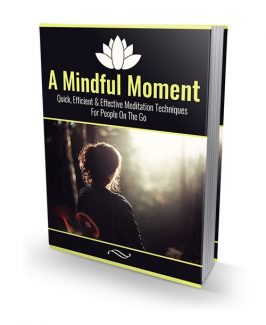 License Type: Master Resell Rights
License Type: Master Resell Rights  File Type: ZIP
File Type: ZIP
 SKU: 61475
SKU: 61475  Shipping: Online Download
Shipping: Online Download
Sample Content Preview
Introduction
Hello and welcome to our short, no-fluff beginners guide to quick & effective meditation techniques for people on the go.
Let's face it; time is a luxury for most people. In fact, most Americans are so busy that they wish there were more hours in a day. Can you imagine that? You spend a tremendous amount of time at work, and when everything is said and done, it appears that you could have put in more time. That's just how busy we are.
Interestingly enough, as busy as Americans seem to be, their productivity is fairly stagnant. There was a huge burst of productivity in past decades, but by and large, it has plateaued. Still, people work more and more hours nowadays.
It is quite a paradox: people are working more and tiring themselves out, but really not achieving all that much. Still, given how busy we are, it's not a surprise that most of us are stressed out, frustrated and can't find inner calm. No wonder meditation and mindfulness are hot nowadays. Americans are starved for a quick daily mental “hack” that effectively recharges their mental, emotional and physical batteries without taking too much time and effort.
Meditation is the best solution you can find to get the balance you're looking for without having to pop pills or sign up for expensive retreats. Best of all, it only takes a few minutes of your day.
This book teaches you the benefits of meditation, how it works, how to find the time to practice it, as well as three quick and easy, relatively effortless techniques that get your personal meditation practice off on the right foot.
Keep in mind that the techniques outlined in this book are meant strictly to get you going. Once you have mastered and gotten used to them, feel free to modify them to fit your particular set of circumstances. Take complete and total ownership of them, so they reflect your daily needs and priorities.
Make them fit your plan. Still, you should master these techniques, and subsequently pick which one is the most comfortable and convenient to you. You can then take liberty with that technique and to fine-tune it, so it produces better results.
Well that’s a basic overview of what we will cover in the beginner’s guide, in the first chapter we will look at the how, what and why of meditation.
Are you ready? Let’s dive in…
Chapter 1 – Meditation: What, How, and Why?
Meditation is all about actively triggering your mind’s internal relaxation processes. That's all it is.
A lot of people are under the impression that meditation is some sort of quasi-religious, mystical, or even deeply personal philosophical journey into your inner world. Actually, if you were to strip out the fluff, packaging and mass media imagery surrounding meditation, it really all boils down to tapping into an internal mental process that we all already have.
I know that sounds shocking because when people think of meditation, they often think about Buddhist monks high on top of some solitary hill, or some Christian monk hidden away in the stony interior chamber of a monastery somewhere in a distant forest. Nothing could be further from the truth.
Meditation, when stripped down to its essentials is really all about rediscovering the internal processes and mental machinery you already have to achieve a deep state of relaxation. Your mind in fact has existing processes that protect it from overheating and breaking down from the wear and tear of all the data processing it does at any given day.
If you focus on what you think about, and what you choose to perceive in any given second, you'd be surprised as to how much information actually flows through your mind. Some peg this data flow to around ninety thousand to a hundred twenty thousand thoughts. It really varies from person to person, but that's a lot of information, and to think that those are only conscious thoughts. This means there are many other things we perceive that we do not think about. So, given all that data you should be able to understand how much stress and pressure your mind is under.
This is why you have to sleep. The more you sleep, the clearer your mind would be the following day, and the more relaxed you would be. In addition, when you sleep, you recharge your willpower, and you will be able to focus more on whatever you need to do the next day. Sleep, and this internal relaxation process formed your personal relaxation core. This core is required for your mind to stay healthy and remain up to the job.








